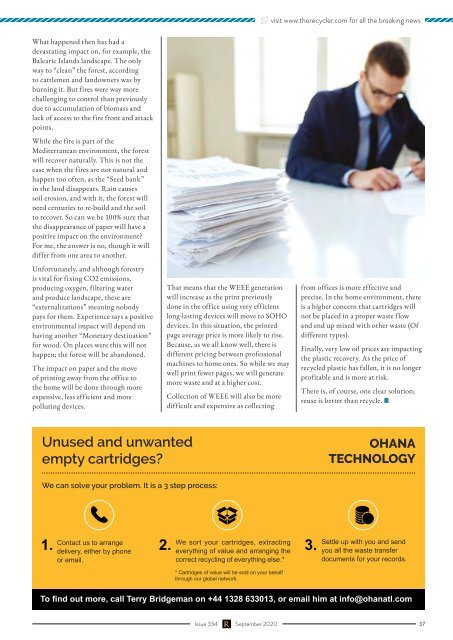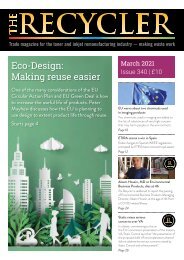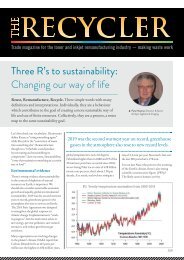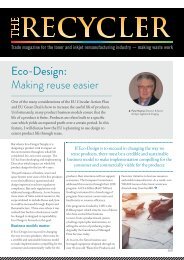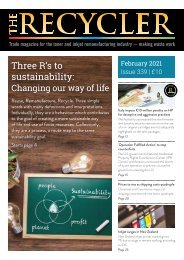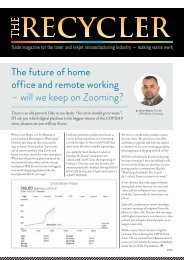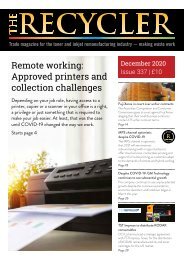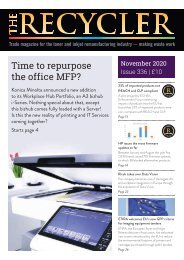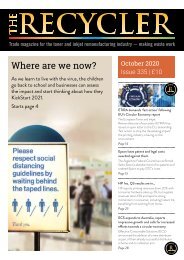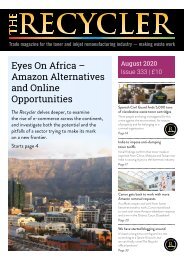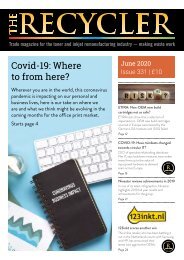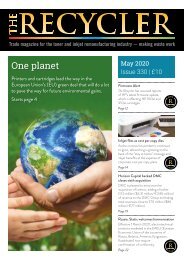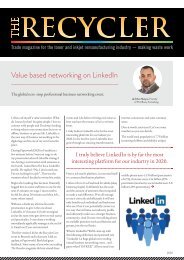The Recycler Issue 334
Create successful ePaper yourself
Turn your PDF publications into a flip-book with our unique Google optimized e-Paper software.
visit www.therecycler.com for all the breaking news<br />
What happened then has had a<br />
devastating impact on, for example, the<br />
Balearic Islands landscape. <strong>The</strong> only<br />
way to “clean” the forest, according<br />
to cattlemen and landowners was by<br />
burning it. But fires were way more<br />
challenging to control than previously<br />
due to accumulation of biomass and<br />
lack of access to the fire front and attack<br />
points.<br />
While the fire is part of the<br />
Mediterranean environment, the forest<br />
will recover naturally. This is not the<br />
case when the fires are not natural and<br />
happen too often, as the “Seed bank”<br />
in the land disappears. Rain causes<br />
soil erosion, and with it, the forest will<br />
need centuries to re-build and the soil<br />
to recover. So can we be 100% sure that<br />
the disappearance of paper will have a<br />
positive impact on the environment?<br />
For me, the answer is no, though it will<br />
differ from one area to another.<br />
Unfortunately, and although forestry<br />
is vital for fixing CO2 emissions,<br />
producing oxygen, filtering water<br />
and produce landscape, these are<br />
“externalizations” meaning nobody<br />
pays for them. Experience says a positive<br />
environmental impact will depend on<br />
having another “Monetary destination”<br />
for wood. On places were this will not<br />
happen; the forest will be abandoned.<br />
<strong>The</strong> impact on paper and the move<br />
of printing away from the office to<br />
the home will be done through more<br />
expensive, less efficient and more<br />
polluting devices.<br />
That means that the WEEE generation<br />
will increase as the print previously<br />
done in the office using very efficient<br />
long-lasting devices will move to SOHO<br />
devices. In this situation, the printed<br />
page average price is more likely to rise.<br />
Because, as we all know well, there is<br />
different pricing between professional<br />
machines to home ones. So while we may<br />
well print fewer pages, we will generate<br />
more waste and at a higher cost.<br />
Collection of WEEE will also be more<br />
difficult and expensive as collecting<br />
from offices is more effective and<br />
precise. In the home environment, there<br />
is a higher concern that cartridges will<br />
not be placed in a proper waste flow<br />
and end up mixed with other waste (Of<br />
different types).<br />
Finally, very low oil prices are impacting<br />
the plastic recovery. As the price of<br />
recycled plastic has fallen, it is no longer<br />
profitable and is more at risk.<br />
<strong>The</strong>re is, of course, one clear solution;<br />
reuse is better than recycle. ■<br />
Unused and unwanted<br />
empty cartridges?<br />
OHANA<br />
TECHNOLOGY<br />
We can solve your problem. It is a 3 step process:<br />
1. 2. 3.<br />
Contact us to arrange<br />
delivery, either by phone<br />
or email.<br />
We sort your cartridges, extracting<br />
everything of value and arranging the<br />
correct recycling of everything else.*<br />
* Cartridges of value will be sold on your behalf<br />
through our global network.<br />
Settle up with you and send<br />
you all the waste transfer<br />
documents for your records.<br />
To find out more, call Terry Bridgeman on +44 1328 633013, or email him at info@ohanatl.com<br />
<strong>Issue</strong> <strong>334</strong><br />
September 2020<br />
37


